Embedded Labs put governments in the driver's seat to generate the data they need and use it to make decisions.
The Embedded Evidence Lab Program assists governments in institutionalizing the use of data and evidence in their policy process. We collaborate with government agencies to establish Embedded Evidence Labs within their organizations, enabling them to use data and evidence to improve their decision-making, policies, and programs. We currently support 19 Labs across 10 countries and 7 sectors, including education, finance, gender, and social protection, among others. Read more in the program 4-pager.
IPA Joins Partners in Collective Initiative to Strengthen Evidence Use in Education |
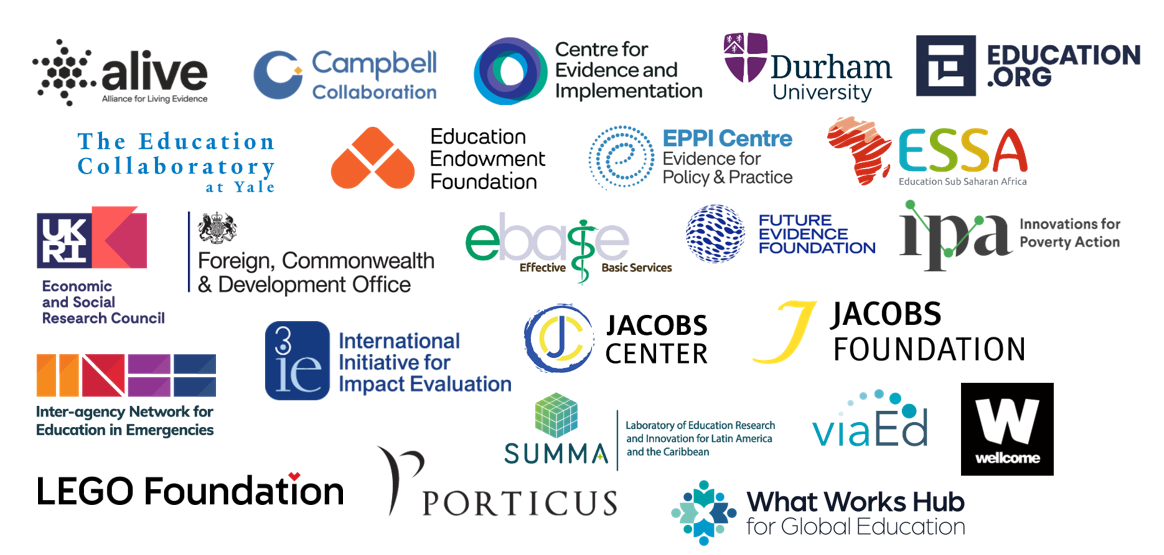 At IPA, we believe education systems work best when decisions are guided by clear, actionable evidence. Yet despite rapid growth in the education evidence base, challenges remain in turning that knowledge into timely, relevant, and accessible insights for decision-makers. That’s why we joined leading education organizations in endorsing a new Statement of Intent to strengthen how evidence is synthesized and applied. Together, we are building a shared repository and supporting evidence intermediaries, Embedded Evidence Labs (Ed Labs)—especially in low-and-middle-income countries—to create policy-relevant syntheses and link them directly to government decision-making. A pilot will launch in 2026, with plans to scale in 2027, ultimately building an evidence infrastructure that will improve learning outcomes for children worldwide. |
Embedded Labs Portfolio
What is an Embedded Evidence Lab?
- Formulation of a Research and Learning Agenda
- Call for proposals for pairing academics with government teams
- Intervention design and piloting
- Impact and process evaluations / AB testing
- Cost-Effectiveness Analysis (CEA)
- Predictive analysis such as machine learning and other advanced analytics for improving forecasting, targeting, clustering, performing
- Natural Language Processing techniques, analysis of unstructured data, etc.
- Descriptive and correlational studies
- Monitoring, Evaluation, and Learning routines (MEL) for better policy implementation
- Literature reviews, and evidence synthesis
- Data visualization and dashboards
- Dissemination and translation
- Policy briefs
- Evidence repositories
- Pre-policy and influence plans
- Technical assistance for scaling
- Use of data and evidence assessments
- Data mapping
- Data protocols improvement
- Data system implementation and strengthening
- Learning by doing
- Trainings and workshops
- Stakeholder mapping
- Research Committees
- Research and Learning Agendas
- Advocacy plans
- Communication plan
What are Embedded Evidence Labs?
Embedded Evidence Labs are teams within government agencies dedicated to making the policymaking process more impactful through data and evidence. They achieve this by identifying the necessary data and evidence to address policy challenges, developing and implementing strategies to generate relevant data and evidence, and facilitating the application of these insights to improve policy decisions that improve people's lives.
What does an Embedded Evidence Lab do?
Embedded Evidence Labs follow a three-stage cycle to achieve impact on public policy:
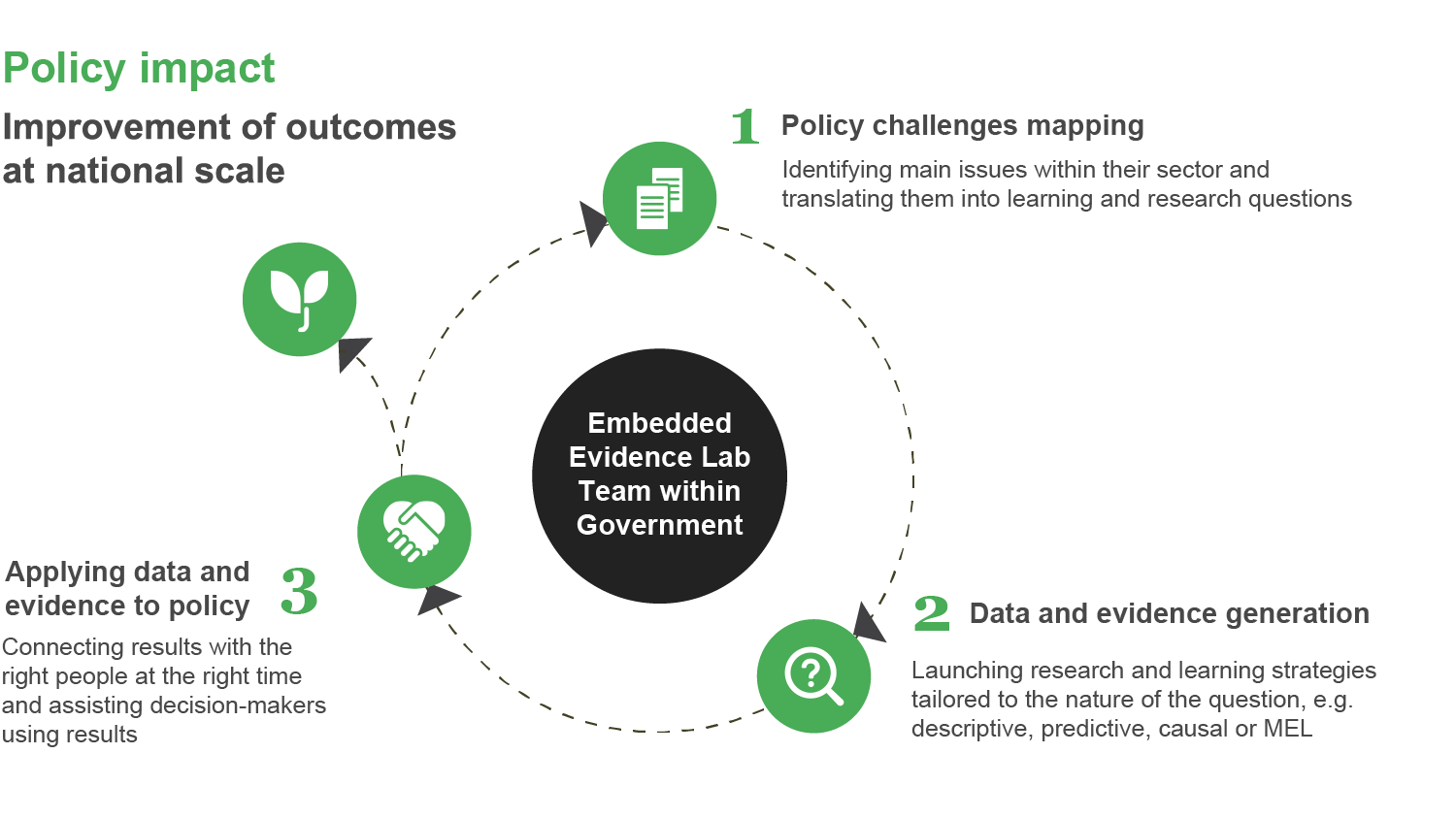
1. Policy Challenge Mapping
The Lab assists in identifying the main issues within its sector and translating them into learning and research questions.
2. Data and Evidence Generation
The Lab launches learning and research strategies tailored to the nature of the questions, such as descriptive analysis, predictive analytics, impact evaluations, or Monitoring, Evaluation, and Learning (MEL) practices.
3. Applying Data and Evidence to Policy
The Lab connects results with the right people at the right time and assists decision-makers in using evidence to improve policy.
What services does an Embedded Evidence Lab offer?
Embedded Evidence Labs support the incorporation of data and evidence into government policies, as well as strengthen government systems to equip them for using data and evidence. Particular Labs may deliver a custom combination of the services described below.
Policy Improvement
Labs offer a variety of policy development services tailored to the specific context of the agency they are embedded in, ensuring that the agency’s key policy goals and research questions are informed by high-quality evidence that is relevant to their policy context. Box 1 provides some examples of these services, though this list is not exhaustive.
Box 1. Examples of Services at Each Step of the Learning Cycle
Step 3: Applying data and evidence to policy |
Strengthening Systems
The Labs also work to strengthen the systems in which they operate so they can carry out the learning cycle activities. For example, Labs can implement strategies to improve system data, enabling its use for large-scale policy monitoring or impact evaluation. They can establish and manage partnerships with stakeholders within and outside the government agency. Additionally, they can implement communication campaigns to promote a culture of using data and evidence, thereby increasing the demand for their services.
Similar to their research and learning services, the system-strengthening services offered by a Lab will vary according to the needs of the government agency. Box 2 provides examples of the services a Lab can deploy to enhance the system's capacity to implement the learning cycle.
Box 2. Example of System Strengthening Services
Individual capacity strengthening Generating partnerships for using data and evidence Demand and support generation |
What is IPA's role in establishing Embedded Labs?
Embedded Evidence Labs are co-designed by IPA alongside government partners who request this support. The co-design process aims to ensure that the Labs are effective in promoting the use of data and evidence while being institutionalized to become an integral and sustainable part of the government. Many of the Labs are the results of long-standing relationships that IPA has cultivated in the countries where we operate. In the initial phase, IPA teams are embedded within the government, working shoulder to shoulder with government officials to co-design and implement the Embedded Lab. Together they advance four Lab components to institutionalize the Lab within the government agency:
Four components of the Lab
 | Process The Lab team designs a learning cycle that connects policy challenges with data, evidence, and decision-making. |
 | Structure and Governance The Lab team determines the location and setup of the team responsible for executing the cycle and decides how the Lab will engage with other supporting technical and political actors. |
 | Capacity The team designs and implements a strategy to strengthen system capacity. This includes enhancing the skills and knowledge of individuals, such as those on the Lab team and in units or departments that use Lab services, as well as improving the capacity of information systems. |
 | Resources The team designs and implements strategies for allocating financial resources to sustain Lab activities and personnel. They also examine legal frameworks to integrate the Lab into the organizational structure and deploy strategies to secure political and ecosystem support. Additionally, Labs address organizational culture by promoting the value of using data and evidence and by generating demand for these practices. |
The process of designing and institutionalizing a Lab is incremental. For example, it involves piloting and refining new processes and structures before institutionalizing them, strengthening capabilities through learning by doing, and negotiating with multiple stakeholders to implement changes to regulations or budgets. As progress is made, the IPA-embedded teams gradually phase out, allowing the Lab to be fully led by the government.
Co-design and institutionalization as an incremental process
IPA Embedded Technical Assistance
| Government Lab |
 | |
| Heavier IPA involvement | Government-owned; IPA exits |
What impact do Embedded Evidence Labs have?
- They can generate evidence about the effectiveness of new interventions and influence the scale-up of evidence-based policies or programs.
- They can apply Monitoring, Evaluation, and Learning (MEL) strategies to enhance the implementation of policies at scale, thereby increasing their impact.
- They can utilize predictive models to refine policy targeting and optimize resource allocation.
- Through the learning cycle, Labs design new processes to effectively integrate data and evidence into decision-making.
- They establish structures with teams equipped with the necessary skills and support from stakeholders both within and outside the government agency. The Lab coordinates and aligns these stakeholders to promote the use of evidence.
- Labs also enhance information systems to provide high-quality data that supports the learning cycle.
- To ensure sustainability, Labs are incorporated into strategic plans or legal frameworks, which grants them legitimacy, operational capacity, and long-term viability.
- Additionally, the government allocates financial resources to the Lab, reinforcing the investment in evidence-based practices.
- By implementing these changes and engaging in projects and partnerships, the Lab promotes the value of using evidence, addressing existing system norms, and cultivates a culture centered around data and evidence use.
Theory of change
Embedded Evidence Labs aim to improve public policy by integrating data and evidence into decision-making, leading to better outcomes for people's lives. Additionally, a Lab modifies the processes, structures, capacities, and resources of a government agency, facilitating the institutionalization of data and evidence use. Consequently, the Labs not only impact policy but also have a systemic impact. This dual impact is illustrated by the theory of change for the Embedded Evidence Labs:
Embedded Evidence Lab Theory of Change
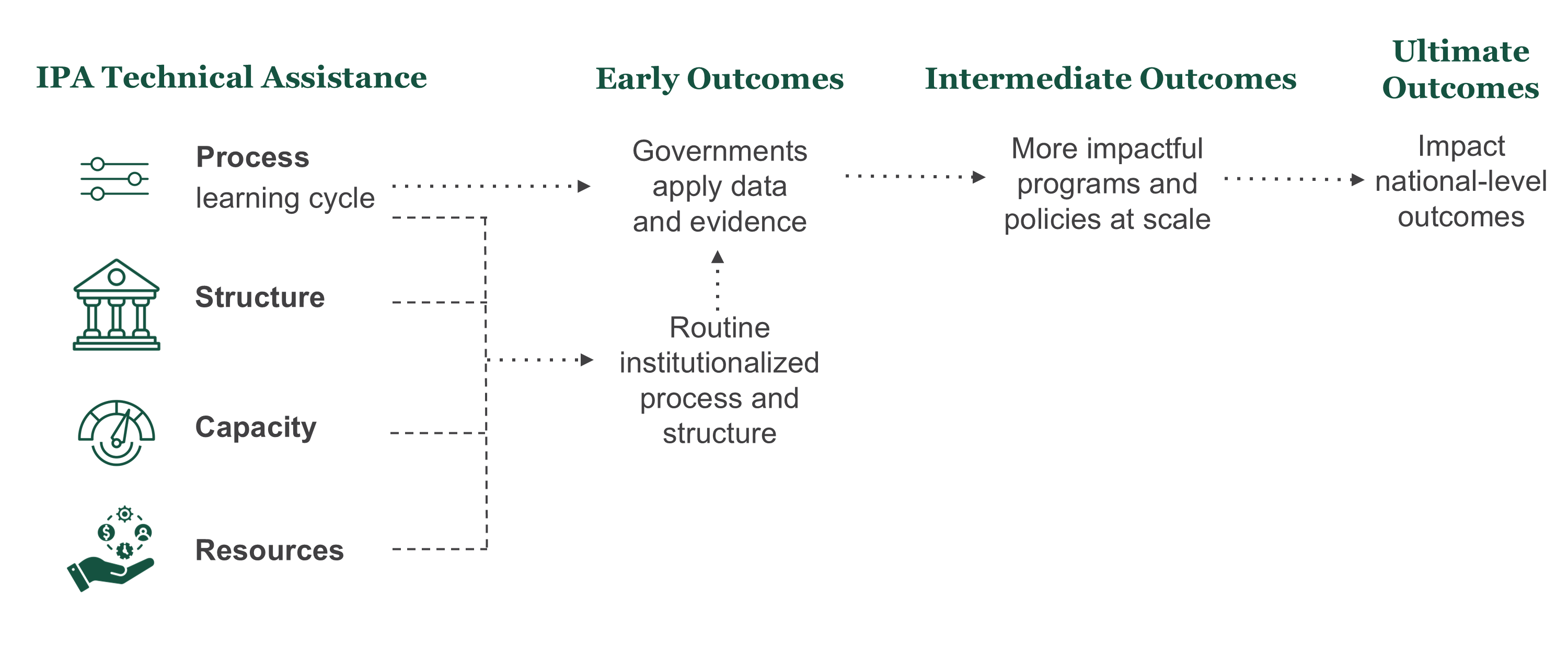
Policy level
By implementing a learning cycle (process) that connects data and evidence with decision-making, Labs can influence the design and implementation of policies and programs. For example:
The integration of data and evidence supports the development and execution of programs and policies that are both effective and scalable. This, in turn, positively impacts key sector-defined outcomes, such as improvements in learning, early childhood development, income levels, or environmental outcomes.
System level
By addressing a government agency's processes, structures, capacities, and resources, Labs facilitate and institutionalize the use of data and evidence within that agency. For example:
This systemic approach ensures the institutionalization of the Lab, leading to the routine integration of data and evidence into the agency's decision-making processes.
What have Embedded Labs achieved?
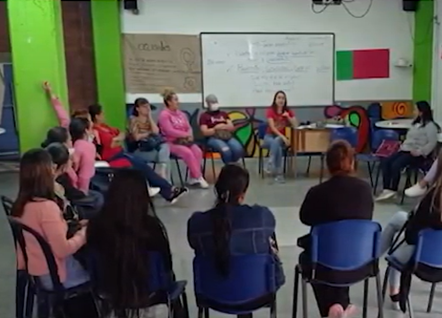 | ColombiaIn Colombia, IPA partnered with ICBF (Colombian Institute of Family Welfare) to establish an Embedded Lab within their Planning Directorate. One of the Lab's projects is Heal to Grow (HtG), a program designed to enhance the socio-emotional skills of Early Childhood Development (ECD) workers through mindfulness-based practices. The randomized evaluation demonstrated that HtG improves the socio-emotional well-being of ECD workers and has a significant positive impact on their strategies for helping children manage their emotions and recognize the emotions of others. HtG is now being scaled as part of ICBF’s ECD program portfolio, and by the end of 2024, ICBF will have reached over 2,000 ECD workers nationwide. |
 | KenyaKenya's Ministry of Education Evidence Hub team has been incorporated into the National Education Sector Strategic Plan (NESSP) 2023-2027, providing the Hub with a budget and official legitimacy as a Ministry strategy for the coming years. The Lab has informed the design of two national-level policies with evidence: the Teacher Education & Training Policy and the Education & Training Sector Gender Policy. |
 | PeruMineduLab, the Peru Ministry of Education's Embedded Evidence Lab, collaborated with local and international researchers to address high school dropout rates. In Peru, 12 percent of children leave school before age 13 and 17 percent do not complete secondary school, so the Lab conducted a randomized evaluation to assess the impact of delivering information about the returns to education through a video series. The campaigns significantly reduced dropout rates: in urban areas, the video series decreased the two-year dropout rate by 1.8 percentage points, an 18.8 percent reduction. With COVID-19 school closures creating the urgent need for policies to keep students engaged, the ministry adapted videos to the TV programming format and broadcasted nationwide. Moreover, the Lab was institutionalized by being incorporated into the legal framework and budget of the ministry and securing political support from internal and external actors to the ministry. This strategy has allowed it to survive 7 changes of presidents and 16 changes of education ministers. |
 | RwandaThe Rwanda Education Embedded Lab is supporting the scaling of performance-based teacher contracts. This program, which was rigorously evaluated in collaboration with researchers from Georgetown University and IPA, demonstrated improvements in both teacher performance and student learning. Following these positive results, the Ministry requested the Lab to scale up the program while testing different delivery methods to identify the most effective approach. The Lab is also developing information systems and capabilities to ensure high-quality program implementation at scale. In 2023, the incentive scheme reached 4,762 teachers and 207,523 primary school students. |
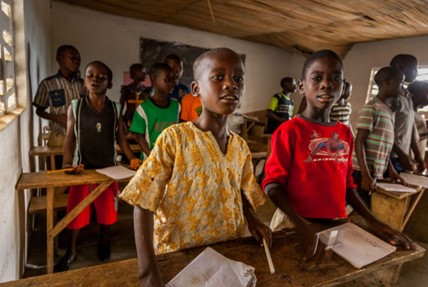 | ZambiaIn Zambia, the Education for All (EFA) school grants policy have become the primary means of funding education, replacing traditional tuition fees and accounting for 50% (USD 85 million) of the non-personnel expenses in the education budget. However, inefficient monitoring capacity initially hindered the Ministry’s ability to effectively implement the policy. To address these challenges, the Zambia MoE Lab implemented a transition from paper-based to electronic surveying, accompanied by training for Ministry of Education (MoE) staff in data collection. This shift led to improvements in data analysis and enhanced reports, which subsequently informed revisions to the EFA guidelines. As a result, new grants tailored to the unique needs of special education schools were developed and deployed, addressing specific educational requirements and further supporting the policy's goals. |
Cross-Country Learning Exchange
The Uganda Ministry of Education and Sports Embedded Lab Team, and the IPA Philippines Embedded Lab Team for the Department of Education of the Philippines exchange on their Lab design, successes, and challenges. © IPA 2024
While each Embedded Evidence Lab is tailored to the specific context and needs of the government agency it serves, there are also opportunities for Labs teams to share learnings across sectors and contexts on how to navigate political and technical complexities, address systemic changes such as revising regulations or negotiating budgets, and enhance the capacities of their teams. To support these efforts, IPA’s Embedded Labs program helps to create networks for learning and exchange.
Cross-Country Learning Exchange
IPA has launched the Cross-Country Learning Exchange (CCLE), a space to promote learning and exchange among governments leading the conversation on how to incorporate data and evidence into decision-making (see examples from Uganda, Rwanda and Peru, and Kenya). Watch the highlights from the exchange in Peru to see how countries are learning from one another in practice.
Embedded Evidence Lab Community of Practice
The community of practice uses an online format and allows Lab teams to stay connected more frequently around a defined topic.
Monitoring, Evaluation, and Learning (MEL) Plans
All our Labs use a MEL (Monitoring, Evaluation, and Learning) plan to understand their progress in relation to our theory of change and to adapt their management based on this data.
Embedded Evidence Labs Learning Agenda
Our program and the Labs we support have a learning agenda that documents the key questions we are interested in addressing. Through these strategies, we gather lessons and insights, turning them into practical knowledge products such as tools and publications, and provide capacity-building support through training, technical assistance, and peer exchanges.
MineduLAB has now completed nine evaluations of innovative education interventions (research that has utilized Ministry of Education data), but we started really from scratch… I couldn’t have imagined the spread of these ideas from Peru to Ghana to Zambia (the IPA Ghana team has also started an education lab within the Ministry of Education!), but it’s an honor to have been part of the process. — Annie Chumpitaz Torres, former Head of Monitoring and Strategic Evaluation at the Ministry of Education in Peru |












